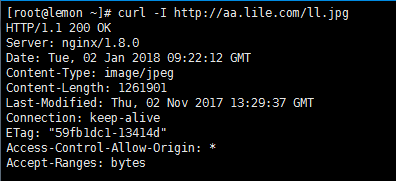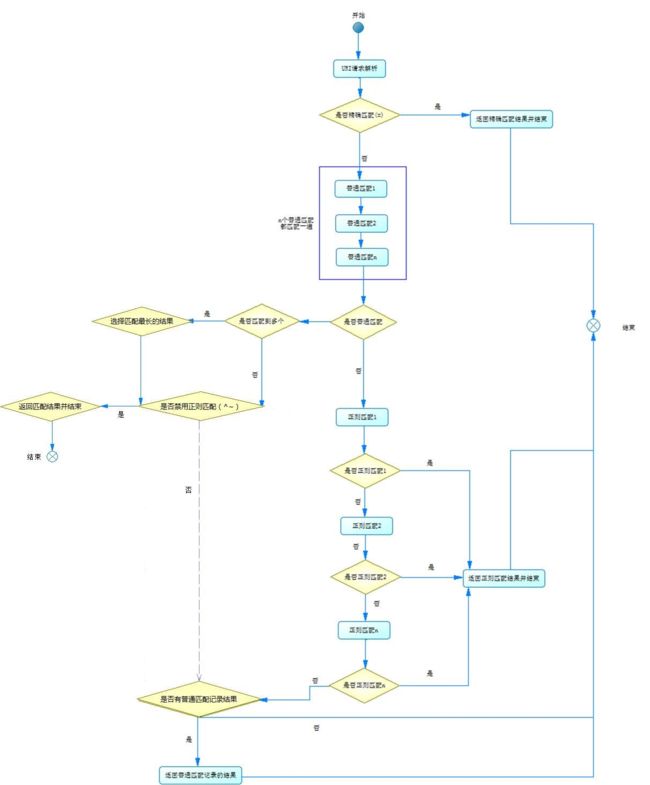问题:nginx设置了expires,但是不生效。有些细节真的是不去用它,不出问题真的发现不了什么
nginx的配置文件如下:
server { listen 80; server_name aa.lile.com; root /data/lile; index index.html index.htm index.php; charset utf-8; location = /favicon.ico { access_log off; log_not_found off; } location = /robots.txt { access_log off; log_not_found off; } access_log on; access_log /var/log/lile.com; sendfile off; location ~ \.(gif|jpg|png|css|js|swf|plist|xml)$ { expires 90d; } location / { add_header Access-Control-Allow-Origin *; } }
设置了:
location ~ \.(gif|jpg|png|css|js|swf|plist|xml)$
{
expires 90d;
}
但是去访问的时候,返回的结果为:
并没有返回过期时间,猜测这是因为location这里的匹配是有优先级的
location的相关知识点:
模块:ngx_http_core_module
官网: http://nginx.org/en/docs/http/ngx_http_core_module.html#location
location的语法结构:
location [ = | ~ | ~* | ^~ ] uri { ...... }
理解及测试:
location = /uri =表示精准匹配,只要完全匹配上才能生效。
location /uri 不带任何修饰符,也表示前缀匹配,但是在正则匹配之后
location / 通用匹配,任何未匹配到其他location的请求都会匹配到
location ^~ /uri 开头对URL路径进行前缀匹配,并且在正则之前。一旦匹配到最长匹配,则不再查找其他匹配项
location ~ pattern 开头表示区分大小写的正则匹配
location ~* pattern 开头表示不区分大小写的正则匹配,如果有多个location匹配,则选择匹配最长的那个
精准匹配: 相等(=)
字符串匹配:字符串匹配(空格)、匹配开头(^~)
正则匹配: 区分大小写匹配(~)、不区分大小写匹配(~*)、区分大小写不匹配(!~)、不区分大小写不匹配(!~*)
优先级:
精准匹配 > 字符串匹配(长 > 短,^~匹配是最长匹配则停止匹配) > 正则匹配(先后顺序)
精准匹配只能匹配一个
字符串匹配使用匹配最长的为匹配结果
正则匹配按照location定义的顺序进行匹配,先定义具有最高优先级
注:字符串匹配优先搜索,但是只是记录下最长的匹配(如果^~是最长匹配,则会直接命中,停止搜索正则),然后继续正则匹配,如果有正则匹配,则命中正则匹配,如果没有正则匹配,则命中最长的字符串匹配
自己总结匹配顺序:
1)精准匹配,若成功,则停止后面的步骤,若没有,继续下面的步骤
2)普通匹配(若有多个匹配项匹配成功,那么选择匹配长的并记录,并继续下面的匹配步骤,
若这个匹配长的记录刚好是^~,那么就不再进行下面的步骤)
3)正则表达式匹配(若匹配到了,那么返回正则表达式匹配到的;若有多个正则匹配到了,那么选择配置文件正则在前面的那一个,若没有,那么返回第二步中,匹配最长的那个)
例1:
server { listen 80; server_name aaaa.lile.com; root /data/lile; index index.html index.htm index.php; charset utf-8; location = /favicon.ico { access_log off; log_not_found off; } location = /robots.txt { access_log off; log_not_found off; } access_log on; access_log /var/log/lile.com; sendfile off; location = /images/test.png { return 001; } location /images/test.png { return 002; } location \/images\/test\.png$ { return 003; } location = / { index index.html; } location / { return 005; } }
测试1:精准匹配
测试2:
这个按理说是应该要精准匹配到index.html,但是匹配到了返回005的这里,这是因为http://aaaa.lile.com会跳转到http://aaaa.lile.com/index.com
如果把上面的
location = / { location = / {
index index.html; =======》 改为 return 004;
} }
那么再测试访问http://aaaa.lile.com的时候就会返回004

例2:
server { listen 80; server_name aaaaa.lile.com; root /data/lile; index index.html index.htm index.php; charset utf-8; location = /favicon.ico { access_log off; log_not_found off; } location = /robots.txt { access_log off; log_not_found off; } access_log on; access_log /var/log/lile.com; sendfile off; location /images/test.png { return 001; } location ^~ /images/ { return 002; } location ~ \/images\/test\.png$ { return 003; } location ~ \/images\/ { return 004; } }
测试1:
当匹配到001时,只是做记录,后面还要正则匹配,正则匹配到了003,若在正则匹配的时候没有匹配到,那么就会返回001
例3:
server { listen 80; server_name aaaaa.lile.com; root /data/lile; index index.html index.htm index.php; charset utf-8; location = /favicon.ico { access_log off; log_not_found off; } location = /robots.txt { access_log off; log_not_found off; } access_log on; access_log /var/log/lile.com; sendfile off; location /images/ { return 001; } location ^~ /images/test.png { return 002; } location ~ /images/test\.png$ { return 003; } location ~ \/images\/ { return 004; } }
测试1:
例4:
server { listen 80; server_name aa.lile.com; index index.html index.htm index.php; charset utf-8; location = /favicon.ico { access_log off; log_not_found off; } location = /robots.txt { access_log off; log_not_found off; } access_log on; access_log /var/log/lile.com; sendfile off; location ~* \.jpg$ { return 3; } location ^~ /a { return 4; } location /a/1.jpg { return 5; } location / { return 7; } }
测试1:
与
为什么不一样?
这里一直理解错了,并不是只要一匹配到了^~就停止,而是当匹配到^~,并且是^~是最长匹配的时候才停止,所以过程如下:
/a/1.jpg的匹配过程为:
1)location /a/1.jpg
2)location ^~ /a 这里的^~并不是最长匹配,所以继续下面的步骤
3)location ~* \.jpg$ 匹配成功,所以返回003
/a/2.jpg的匹配过程为:
1)location ^~ /a 因为它直接匹配到这里,并且是最长的所以停止匹配,返回004
匹配流程图:
回到最上面的出现的问题,就能知道为什么了。
server { listen 80; server_name aa.lile.com; root /data/lile; index index.html index.htm index.php; charset utf-8; location = /favicon.ico { access_log off; log_not_found off; } location = /robots.txt { access_log off; log_not_found off; } access_log on; access_log /var/log/lile.com; sendfile off; location ~ \.(gif|jpg|png|css|js|swf|plist|xml)$ { return 111; expires 90d; } location / { return 222; add_header Access-Control-Allow-Origin *; } }
测试一下:按理说应该先匹配上面的那个返回111,但是结果却不一样,返回的是222;这是为什么呢
经过不断的看,终于发现了这个符号是错的,不是英文下的反斜线,而是全角符号的反斜线
改过来,重新reload一下nginx的配置文件,现在就返回正常了:
相关博文:
https://www.2cto.com/kf/201703/616033.html 理解源于此
http://blog.csdn.net/gnail_oug/article/details/53236898 (上图来自于此)










